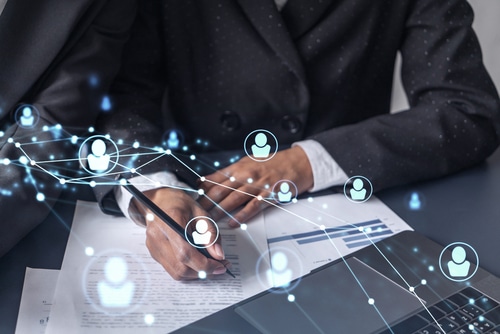In today’s ever-changing job market, HR innovation is not only welcomed but also necessary. Thanks to significant technological advancements, AI has transitioned from a futuristic concept to a daily reality.
In fact, the majority of HR leaders are already leveraging AI across various HR functions, a recent survey by Eightfold found.
Our guest for this week’s HR Query, Kajetan Armansperg, Co-Founder & Co-CEO of Leapsome – a people enablement platform – says AI’s role in HR is an improver, accelerator, and optimizer of content created by humans.
“We strongly believe in the potential of new AI features, designed to enhance, not replace, the human role in performance reviews, in particular,” Armansperg explained to HR Daily Advisor. “Feedback should always be prepared and written by a human. But some humans are more confident writers than others. When technology is available to accelerate, streamline, and improve our work — we should embrace it.”
Read on to find out Armansperg’s insights about how HR professionals can unlock the power of AI while mitigating risks.
How can organizations understand and mitigate the potential risks of AI?
While the benefits of AI are numerous, it’s important to note that AI technologies, given their novelty, present a unique set of risks that should be carefully managed during their implementation within an organization. As you roll out new AI systems, ensure these undergo regular audits, and stay ahead of updates or changes in the AI space. Keeping vigilance ensures you not only harness the full potential of AI but also navigate its risks effectively.
Safeguarding sensitive data: AI systems heavily rely on data, which raises concerns regarding the privacy and security of employee data and proprietary information. This becomes more crucial when considering instances like the leaked data incident involving Samsung. Leaders must prioritize compliance with data privacy laws and adopt secure and reliable AI solutions to ensure data protection.
Complementary role of AI and human judgment: While AI can provide valuable insights, leaders should avoid relying solely on it for decision-making processes. Human judgment is indispensable, particularly when addressing sensitive matters. A proficient manager exhibits qualities such as empathy, reason, and the ability to assess situations on a case-by-case basis, acknowledging that past behavior does not always predict future behavior. These nuances may elude AI algorithms, emphasizing the importance of human involvement in decision-making processes.
Eliminating biases in AI systems: AI systems, if not managed appropriately, can inadvertently perpetuate biases. To mitigate this, it is crucial to utilize unbiased data and conduct regular audits of AI systems to identify and rectify any potential biases. By ensuring the integrity and fairness of AI algorithms, leaders can promote equitable outcomes and prevent the reinforcement of existing biases within organizational processes.
What is the “new era” of HR? How can organizations prepare for it?
The past few years have seen a dramatic change in employee expectations when it comes to work. Employees are putting importance on work/life balance and development opportunities like never before. Managing these shifts and fostering an engaging work environment is more challenging than ever. The use of AI solutions to support the uniquely human attributes required to build a great organizational culture will make a huge impact on the industry as we move forward.
How can AI streamline and optimize feedback?
When incorporated into performance reviews, AI can help to ensure that each employee receives consistent quality feedback. AI plays a pivotal role in facilitating improved communication, particularly in the era of remote, hybrid, and asynchronous work – where written communication is so important. Disparities in feedback clarity can arise from managers who may be less comfortable or proficient writers. AI can ensure employees receive constructive, transparent, actionable feedback that is consistent with feedback best practices.
Why does AI hold remarkable potential in fostering a more inclusive, diverse, and safe workplace environment?
While AI systems can produce significantly biased outputs based on training data which itself frequently contains historic and systemic biases (as a very basic example, it will frequently assign higher probabilities of certain jobs being carried out by men or women based on historic distributions), it is important to note that AI systems can also contribute to a less biased workplace through enhanced pattern recognition powers.
AI can support identifying biases within hiring or during promotion processes by ensuring equal opportunity based on performance rather than background. In this way, AI helps to eliminate any personal biases. Beyond this, AI can be used to detect and address issues of harassment, bullying, or exclusion, with a recent report showing there is already the potential for AI to reduce online abuse. This can contribute to a safer, more respectful workspace. When incorporated into performance reviews, AI is able to drive greater objectivity and standardization.
The post HR Query: Unlocking AI – The HR Professional’s Guide to Success in 2023 and Beyond appeared first on HR Daily Advisor.
